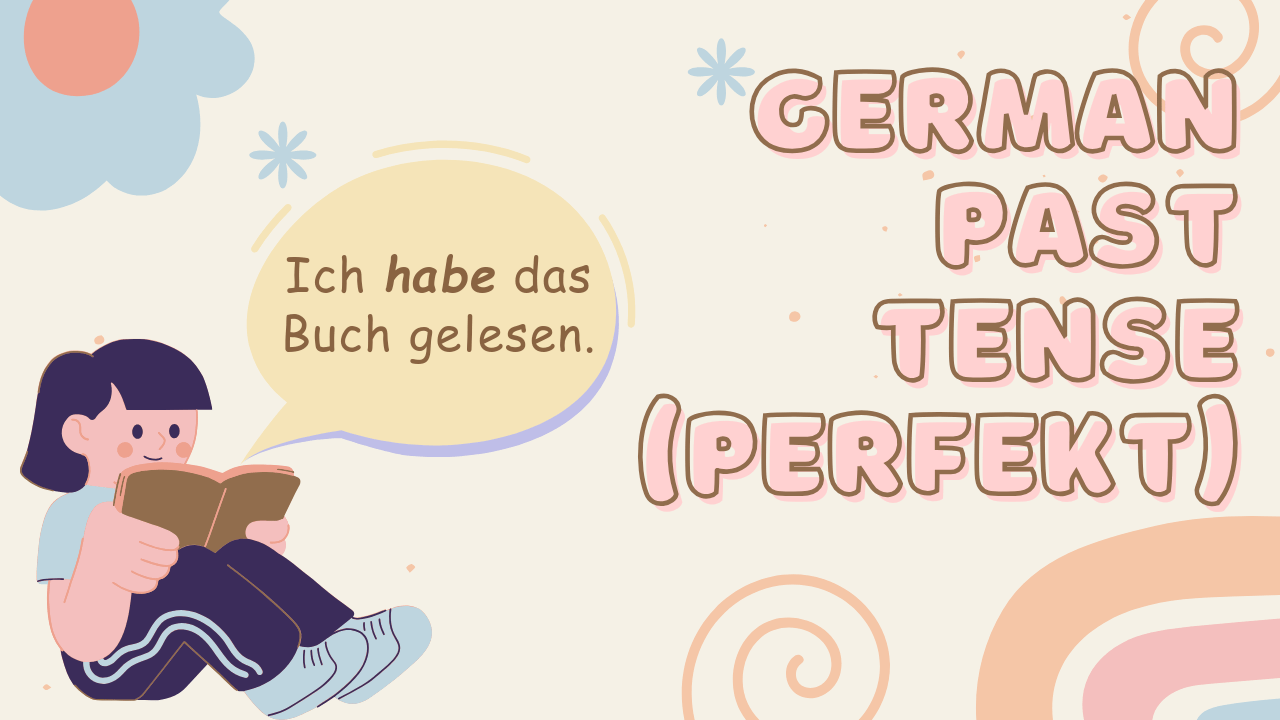Learn How to Use German Past Perfect Tense with Haben and Sein | With Exercises
I. Introduction
A. Overview of German Past Tense (Perfekt)
- The Perfekt tense, alongside Präteritum, is a fundamental way Germans discuss the past. It involves auxiliary verbs (“haben” or “sein”) working with past participles. Perfekt is widely used in everyday spoken German and casual writing.
B. Importance and Common Usage
- The Perfekt tense is commonly used in informal talks to discuss past events, tell personal tales, and describe contemporary actions. It provides an easy method of expressing past activities without the complex grammar of Präteritum or other past tense forms. The Perfekt tense is also often employed in informal writing, including emails, chats, and posts on social media, which makes it an essential tool for daily communication.
II. Formation of German Past Tense (Perfekt)
A. Regular Verbs
Regular verbs have a set way of making the Perfekt tense in German language. For weak verbs (ones without “-ir” at the end), you add “-t” to the verb’s stem. For strong verbs (those with “-ir” at the end), you add “-et” instead.
Weak Verb (without “-ir” at the end):
- Verb: spielen (to play)
- Stem: spiel
- Past Participle: gespielt
- Example Sentence: Ich habe Fußball gespielt. (I played soccer.)
Strong Verb (with “-ir” at the end):
- Verb: verlieren (to lose)
- Stem: verlier
- Past Participle: verloren
- Example Sentence: Sie hat den Wettbewerb verloren. (She lost the competition.)
B. Irregular Verbs
- The irregular verbs in German language differ from the typical pattern, you need to be careful of their past participles. The irregular verbs “haben” (to have) and “sein” (to be) are two examples. For instance:
- Ich habe gegessen. (I have eaten.)
- Wir sind gekommen. (We have come.)
C. Separable and Inseparable Prefix Verbs
- Separable prefix verbs involve a prefix that separates from the verb stem in the Perfekt tense. The prefix goes to the end of the sentence, and the past participle is formed as usual. Inseparable prefix verbs keep the prefix attached to the verb stem. Examples:
- Separable: anfangen (to begin)
- Ich habe mit dem Buch angefangen. (I started with the book.)
- Inseparable: verstehen (to understand)
- Er hat die Frage nicht verstanden. (He didn’t understand the question.)
- Separable: anfangen (to begin)
III. The Use of Auxiliary Verbs
A. Conjugation of “haben” and “sein”
In the Perfekt tense, the two auxiliary verbs (“haben” and “sein”) are used in creating past participles. The choice between them depends on the main verb and the context. Here’s how they are conjugated:
Conjugation of “haben”:
- Ich habe (I have)
- Du hast (You have – singular, informal)
- Er/Sie/Es hat (He/She/It has)
- Wir haben (We have)
- Ihr habt (You have – plural or singular, formal)
- Sie haben (They/You have – formal)
- Conjugation of “sein”:
- Ich bin (I am)
- Du bist (You are – singular, informal)
- Er/Sie/Es ist (He/She/It is)
- Wir sind (We are)
- Ihr seid (You are – plural or singular, formal)
- Sie sind (They/You are – formal)
B. Selection Criteria for “haben” and “sein”
The choice between “sein” and “haben” as auxiliary verbs is determined by the activity being described and the main verb.
“haben” is generally used with:
- Most transitive verbs (verbs that have a direct object): Ich habe das Buch gelesen. (I have read the book.)
- Intransitive verbs are verbs without a direct object: Ich habe geschlafen. (I have slept.)
- “sein” is typically used with:
- Verbs indicating motion or change of condition: Sie ist nach Hause gegangen. (She went home.)
- Certain intransitive verbs, especially those expressing a change of state: Die Blumen sind gewachsen. (The flowers have grown.)
IV. Time Expressions in German Past Tense
A. Temporal Phrases Indicating Past Actions
- To anchor actions in the past, specific time expressions are used in conjunction with the Perfekt tense. Some common temporal phrases include:
- Gestern (Yesterday): Wir haben uns gestern getroffen. (We met yesterday.)
- Letzte Woche (Last week): Sie hat letzte Woche gearbeitet. (She worked last week.)
- Im letzten Jahr (Last year): Ich bin im letzten Jahr umgezogen. (I moved last year.)
- Vor zwei Tagen (Two days ago): Er hat vor zwei Tagen angerufen. (He called two days ago.)
B. Adverbs and Adverbial Phrases for Time Reference
- When describing the exact moment an activity occurred, adverbs are essential. Adverbs and adverbial expressions are used in a period of time:
- Heute Morgen (This morning): Ich habe heute Morgen gefrühstückt. (I had breakfast this morning.)
- Abends (In the evening): Wir sind abends spazieren gegangen. (We went for a walk in the evening.)
- Nachts (At night): Der Hund hat nachts gebellt. (The dog barked at night.)
- Endlich (Finally): Sie ist endlich angekommen. (She finally arrived.)
V. Regular Practice Exercises
Why dont you try these exercises for German Past Perfekt Tense?
A. Fill in the Blank Sentences
- Ich _ gestern ins Kino. (gehen)
- Wir _ schon viel über das Thema. (sprechen)
- Sie _ den ganzen Tag an dem Projekt. (arbeiten)
- Du _ die Antwort nicht. (wissen)
- Der Lehrer _ die Hausaufgaben überprüft. (korrigieren)
B. Verb Conjugation Practice
Conjugate the following verbs in the Perfekt tense:
- spielen (ich)
- lesen (du)
- trinken (wir)
- kommen (sie)
- machen (ich)
VI. Common Mistakes and Tips
A. Differentiating “haben” and “sein”
- Confusing “haben” with “sein”:
- Tip: Keep in mind that “haben” is often used for activities involving holding or owning something, but “sein” is reserved for verbs relating to motion, state change, or existence.
- Correct: Ich habe das Buch gelesen. (I have read the book.)
- Incorrect: Ich bin das Buch gelesen.
- Tip: Keep in mind that “haben” is often used for activities involving holding or owning something, but “sein” is reserved for verbs relating to motion, state change, or existence.
- Incorrect Selection of Auxiliary Verb:
- Tip: Pay attention to the specific verbs that require “sein” as the auxiliary, such as verbs indicating motion or a change of condition.
- Correct: Wir sind gestern spazieren gegangen. (We went for a walk yesterday.)
- Incorrect: Wir haben gestern spazieren gegangen.
- Tip: Pay attention to the specific verbs that require “sein” as the auxiliary, such as verbs indicating motion or a change of condition.
B. Proper Use of Time Expressions
- Misplacing Time Expressions:
- Tip: Ensure that time expressions are correctly positioned in the sentence to provide clear temporal context.
- Correct: Gestern habe ich meine Freunde getroffen. (Yesterday, I met my friends.)
- Incorrect: Ich habe gestern meine Freunde getroffen.
- Tip: Ensure that time expressions are correctly positioned in the sentence to provide clear temporal context.
- Overlooking Adverbial Phrases:
- Tip: Be mindful of adverbs and adverbial phrases that add specificity to the timing of actions.
- Correct: Ich habe das heute Morgen erledigt. (I did that this morning.)
- Incorrect: Ich habe das erledigt heute Morgen.
- Tip: Be mindful of adverbs and adverbial phrases that add specificity to the timing of actions.
VII. Conclusion
In speaking the language fluently, one must master the usage of the Past Tense (Perfekt) in German language. It requires an understanding of the differences both regular and irregular verbs, the construction of past participles using the words “haben” and “sein,” and the proper use of temporal expressions. Regular practice, engaging oneself in German literature and discussions, and accepting that mistakes are the keys to improvement for learning the German language. Learners can become fluent and confident in their use of the past tense in German with commitment and persistence.

